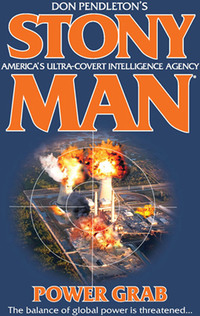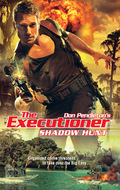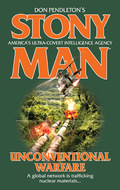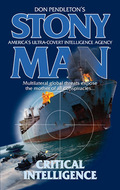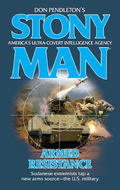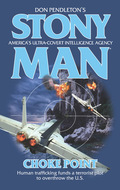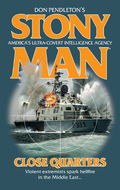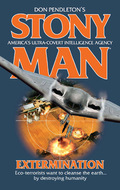Książki nie można pobrać jako pliku, ale można ją czytać w naszej aplikacji lub online na stronie.
Czytaj książkę: «Power Grab»
BROGNOLA SOUNDED ESPECIALLY WEARY
“On the world stage, meanwhile,” he said, “the Man is worried that we can’t simply hit Ovan and cut this off at the source, because all of the evidence we have is covert intelligence. We can’t afford to point to any more satellite photos of WMD factories that turn out to be anything but…and we can’t afford to move against Turkmenistan in an official capacity, not even as a black operation, unless we can turn public opinion against Ovan and show the world he’s got his hands in the terror attacks in Iran. If his involvement is exposed, the Iranians will scream bloody murder about the interference, and Magham’s fate will be sealed. That’s especially true if his own involvement in the plot is outed.”
“So what are we doing?” Lyons asked.
“A WMD-equipped Ovan would be a nightmare for us all,” Brognola said. “His terror network, at this point, quite possibly rivals al Qaeda. But more years of hard-line rule under Magham does no one any favors, either. We need to expose the terror link in Iran and do what we can to ensure an honest victory for Khan while putting a stop to Ovan’s terror network and removing him from power.”
“Oh, is that all?” McCarter said.
Power Grab
Stony Man®
America’s Ultra-Cover Intelligence Agency
Don Pendleton

Power Grab
CONTENTS
PROLOGUE
CHAPTER ONE
CHAPTER TWO
CHAPTER THREE
CHAPTER FOUR
CHAPTER FIVE
CHAPTER SIX
CHAPTER SEVEN
CHAPTER EIGHT
CHAPTER NINE
CHAPTER TEN
CHAPTER ELEVEN
CHAPTER TWELVE
CHAPTER THIRTEEN
CHAPTER FOURTEEN
CHAPTER FIFTEEN
CHAPTER SIXTEEN
CHAPTER SEVENTEEN
CHAPTER EIGHTEEN
CHAPTER NINETEEN
CHAPTER TWENTY
CHAPTER TWENTY-ONE
CHAPTER TWENTY-TWO
CHAPTER TWENTY-THREE
CHAPTER TWENTY-FOUR
EPILOGUE
PROLOGUE
Rochester, New York
“Quiet!” Nargoly Pyragy ordered. “He is coming!”
The three men watched, crouched behind the concrete-and-faux-marble planter from which projected fake trees covered in plastic leaves. Pyragy, painfully thin, his dark hair thinning, was the oldest and smallest of the trio and was painfully aware of the responsibility he bore. The two others, Kanzi Nihemedow and Gandosi Burdimedezov, were still in their prime and only too eager to strike a blow against the Great Satan. Pyragy would have scoffed had he been alone. He had long since seen the emptiness of such rhetoric. The rest was simply a job, a dangerous job, left to him to conduct.
Nihemedow, who was built like Pyragy but much more handsome, saw himself as the dashing hero of some fantasy. To him the dirty, risky business of such raids was something from a storybook he would read his many children one day. Burdimedezov, the big one, thicker by half through the shoulders than even the second-biggest man Pyragy had ever met, was at least more realistic, though perhaps a bit too willing to rush headlong into danger. That would fade, leaving a skillful operator in its place, for Pyragy knew the large man had in him the ability to go far in intelligence services.
Too many underestimated a fellow Burdimedezov’s size, believing him slow-witted muscle. Gandosi Burdimedezov, Pyragy had no doubt, liked it just so. Such a man preferred to be underestimated. Yes, he would go far…and most likely outlive a veteran like Pyragy by decades.
But then, such a thing was never certain in work like this.
Pyragy placed the metal case gently in position. As had been explained to them, the mechanism was perfectly safe until it was armed. Even then, it should not be fully active, as the technicians explained, until they were well clear. Pyragy wasn’t sure how much faith he placed in the pronouncements of men who wouldn’t be in the field, next to the bomb, betting their lives on these assurances. He didn’t have any choice. At times like these he envied those whose religious faith told them a glorious death in battle against the West would guarantee them a path to Paradise. Pyragy had long ago given up on any such fantasies; he had seen too much, done too much and killed too much to believe in anything but the finality of a bullet or the cold touch of sharpened steel.
He pressed the buttons of the external keypad in sequence. There were five, all blank, lined up for the fingers of a man’s hand. He tapped the combination from memory. There was a chirping acknowledgment from inside the box, loud enough for only Pyragy to hear, and he jerked despite himself when he heard it. Glancing left, then right, making sure the two men with him had not seen, he turned his attention back to the case.
The lid opened slowly on small hydraulic pistons, as if the box wished to reveal its contents dramatically. Inside, the flashing lights of the computerized status board blinked slowly as text scrolled across the three backlighted LCD screens in the machine’s face.
At the front of the case, dominating the lower half of the hinged mechanism, three stainless-steel orbs were set half flush with the midline of the case. These were the explosives themselves, the warheads. Each was the size of a baseball and each was staggeringly deadly—a shaped plastic explosive core covered in hexagonal shrapnel plates that were in turn layered with solid toxins. On detonation, the shrapnel would excite the toxic resin layer and produce a poison cloud that would linger over the blast radius.
Knowing that there would be no turning back after he pressed the buttons, Pyragy entered the start-up sequence. The machine hummed. Its status readouts responded immediately. Pyragy moved as far from the bomb as he could, which was not very far. Again he hoped that neither of the other two men noticed his actions.
Nihemedow, who was never truly still, began to peer around the side of the planter. Grateful for the chance to focus on more concrete concerns, Pyragy poked him with two fingers and made a sharp gesture of warning. Nihemedow returned the look with one of dire portent but withdrew his head just as the security guard’s footsteps grew louder. The man had rounded the corner and would soon pass by their location.
In planning this step of the operation, it was of course Nihemedow who suggested the guard be killed. There was a single night guard known to patrol within the shopping mall at night. There were options for dealing with him. They could wait for him to complete his circuit, plant the device while the man was known to take a scheduled break from eleven o’clock to eleven-thirty and escape before anyone suspected. This option carried with it the risk of discovery during any point. The device would have to be tended while it went through its interminable acclimation program, during which it could not be disturbed. If the guard were to vary his routine, which Pyragy and his team had established during the previous weeks’ surveillance, it could ruin everything.
To say he had reluctantly approved the assassination of one fat American would be overstating the case. He didn’t care. He wasn’t the sort of man to leave any detail to chance or to last-minute decisions, however, so the act had been preplanned right to the man who would do it. Kanzi Nihemedow was eager to blood himself—perhaps too eager—and so he would do the deed. It seemed like such a small detail, in the grand scheme of things, but the death of any single man was no small thing. There was great power in death. This Pyragy understood.
The rasping sound of Nihemedow’s knife leaving its sheath set Pyragy’s teeth on edge. It was too loud. His thought had been that their silenced pistols would leave behind evidence whereas a knifing could easily be dismissed as a failed mugging or burglary. Looking at it now, in the split second he had to consider the situation, Pyragy decided it would have been better to shoot the guard.
The guard turned his head toward the three men.
Nihemedow, indeed too eager, screamed in bloodlust, his yell almost an ululation. He rushed forward, the knife coming up, the keen blade poised to strike. The guard froze and his eyes went wide. His hands came up as if he would ward off the charging attacker with his fear alone.
The knife flashed downward.
Nihemedow missed.
Had he not been watching, Pyragy would have thought it impossible. The arc of the knife passed down and through the place where the guard should have been. Some analytical part of Pyragy’s brain understood what his senses refused to acknowledge. Kanzi had been a half step off in his overeager charge. The two men collided and hit the slick, polished floor in a heap.
“Go, go!” Pyragy ordered Gandosi Burdimedezov. “Stop him!”
Burdimedezov hurried…but it was too late. Nihemedow made a sort of retching, choking noise and fell to his knees, clutching at himself. Burdimedezov threw himself into the fray. There was a moment’s scuffling as Nihemedow was knocked flat, then he curled into a ball and screamed in pain and terror. Then it was Burdimedezov yelping, the sound a strange one from so stolid a man. It was a shriek of pain and shock, of surprise. Then Burdimedezov was falling backward, landing painfully in a sitting position, clutching one of his hands. The guard fled beyond him.
Pyragy stood and ripped the Ruger .22 pistol with its attached, handmade silencer from his waistband and began pulling the pistol’s trigger as fast as he could. The bullets raised flecks of colored facade from the walls of the corridor leading away from their position as the guard ducked, dodged and scrambled for all he was worth. Pyragy cursed as his pistol ran dry. He threw it to the floor in rage.
“Why!” he demanded, wheeling on Burdimedezov. “Why have you done this?”
“He had a knife!” Burdimedezov shrieked. It was then that Pyragy saw the blood streaming from Gandosi’s arm and from the hand he clutched tightly in his other palm.
“But,” Pyragy argued, “he is a private security guard! They do not carry combat knives. That is absurd!”
“He had a knife, I tell you,” Burdimedezov snorted, sounding nothing like himself as he paled from the blood loss. A pool of sticky crimson had begun to widen around him on the floor, and Pyragy realized then how severe the damage must be. “He had a knife clipped to the pocket of his trousers. A folding knife. He flicked it open and cut me.”
Pyragy would not have believed it if he had not seen it. Americans were soft. Weak. Everyone knew that. They guarded their airports with soldiers who did not have magazines in their rifles. They apologized to the leaders of nations whose citizens streamed across U.S. borders illegally. They listened to the enemy abroad in their countless wars and “police actions,” and prosecuted their own soldiers for killing those enemies too efficiently. How, then, could one fat American fool have been armed and prepared to resist? It boggled the mind.
“See to Kanzi,” Pyragy ordered. “He will call for help. We must make sure they do not find the bomb.” Heedless of the danger, for in truth there was supposed to be no danger yet, Pyragy used a foot to shove the bomb deep into the planter he and his team had chosen for the purpose. He took a moment to arrange some of the plant fronds to cover it. Glancing at his watch, he cursed. The box was not supposed to be moved for another fifteen minutes. He had been told this over and over again: the bomb required a very specific time for preset acclimation to its environment, to ensure maximum casualties when its sensors and processors were triggered.
Well, there was no help for that now. If he did not hide the bomb, its discovery would render the entire mission a failure. He would not have such a waste on his record. He would not allow himself to fail.
So the bomb would perhaps detonate prematurely. No matter. Even if it killed no one, the explosion would have the desired effect. The Americans would see yet again that the safe little world of illusion in which they lived was not so safe at all. They could be touched. They could be harmed. One of their most precious icons of their sick, capitalist, consumerist world, a shopping mall, a temple to greed, would become a killing ground in their minds, even if there were no victims. Each time one of the lazy Westerners set foot in a shop or in any public place, he or she would be wondering if an explosion was imminent. Wasn’t that what a campaign such as this was about?
That was how Pyragy would justify his failure to his superiors, at any rate. With luck, he could convince them that his mission, while not technically successful, was not so horrible a failure as to warrant punishment for him…or for his family.
Burdimedezov dragged Nihemedow up, who still clutched his stomach. “Let me see it,” Burdimedezov ordered. “Let me see it,” he said again, more forcefully. He pushed his partner to a sitting position on a nearby bench.
Pyragy grabbed the heavy duffel bag they had brought with them. His mind began running through what he knew of their situation. They had broken through the glass doors at the rear of the mall, where the periodic parking lot patrols frequently did not come close enough for the drivers to notice such a breach because of the placement of large trash containers and an overgrowth of trees and vines close to the face of the building. The security system’s motion sensors, and other electrical components of the obsolete security devices in this structure, were being jammed by the device Pyragy carried on his belt. All of these measures were supposed to have enabled them to break in, place the bomb and get out, disguising their breach as simple vandalism.
Now the guard would be summoning police, and telling those police that armed, dangerous men were in the building. Pyragy pulled back the heavy zipper of the duffel bag and removed a pair of AK-47 rifles with folding metal stocks. He slapped one 30-round magazine home and racked the bolt of the weapon.
“Gandosi,” he said. “How badly are you hurt?”
“I will live,” Burdimedezov said, his composure returning. Pyragy knew that sensation well. Having temporarily failed, having sustained unanticipated injury, Burdimedezov would be eager to reassert his manhood, to prove that he was no coward and no weakling.
“Your arm looks very bad,” Pyragy said, preparing a second AK-47. “You have lost much blood.”
“Give me the tape,” Burdimedezov said simply. Kanzi Nihemedow sat half crouched on the bench nearby, whimpering.
Pyragy produced a roll of silver duct tape from the bag and threw it to Burdimedezov, who caught it with his uninjured hand. He began using his teeth to break the tape as he wrapped strips of it around his arm and hand. He was still very pale, and his arm and the leg of his pants were stained through with blood, but he showed no signs of slowing down.
“Kanzi?” Pyragy asked.
“He is barely conscious,” Burdimedezov said, looking again to his wounded comrade and placing a hand on either side of the man’s face to peer directly into his eyes. “He clutches his stomach and refuses to let go. He is bleeding everywhere. I think the American pig gutted him.”
Pyragy cursed again. “I do not believe it,” he said.
“Kanzi. Kanzi!” Gandosi Burdimedezov shouted. He shook his head. “He does not respond to me at all,” he said.
Pyragy, his rifle cradled in one arm, went to stand over them both. He slapped Nihemedow hard across the face.
“Operative Nihemedow!” he bellowed. “Report! You are ordered to report!”
Nihemedow’s eyelids fluttered. He finally fixed Pyragy with a sickly gaze, sweat beading on his forehead and cheeks. “Yes…yes, sir,” he finally responded.
“Get him a rifle,” Pyragy said, not removing his eyes from Nihemedow’s.
“But, sir,” Burdimedezov said.
“We have moments,” Pyragy said. “Unless the guard has decided he fears the legal repercussions of his actions, he will have gone straight for help. We have but one choice, and that is to make the Americans believe we came to attack the mall directly. If we sell our lives dearly, perhaps they will not investigate too thoroughly. They may not find the bomb. It may still do its job.”
“Have we no chance to fight clear?”
“There is a chance,” Pyragy said. “A slim one. We could, of course, leave now…but the Americans would wonder what we did here. Their authorities would search this place for clues. We must give them an obvious answer, prevent that search from taking place.”
“They may still search,” Burdimedezov said.
“Perhaps,” Pyragy agreed. “But do we dare do less for the cause?”
Burdimedezov thought about that for a moment. “No, sir.”
“Then it is agreed,” Pyragy said. “Now get Kanzi a rifle.”
Burdimedezov brought the third Kalashnikov from the duffel bag, loaded it, racked the bolt, and moved the selector switch to full-auto. He set the rifle aside for a moment and looked up at his leader.
“Help me with him,” he said. “I must tape him up.”
Understanding, Pyragy managed to lift Nihemedow’s arms. The man’s resistance, and his strength, were fading fast. Soaked in blood and gore, Burdimedezov managed to wrap layer after layer of duct tape around Nihemedow’s stomach.
“Tape his hands to the rifle,” Pyragy said.
Burdimedezov looked up at him, then back to his injured colleague, but did as he was instructed. At his leader’s direction, he propped Nihemedow up on the bench facing the corridor down which the guard had disappeared.
“They will come from that direction.” Pyragy nodded. They could hear the faint wail of sirens in the background now, and knew that the battle was coming. “Take position over there, by that archway. I will conceal myself near the planter once more. Our enemy may be police, and may be their special weapons and tactics personnel. If it is the latter we have much less chance…but if the former, we can shoot our way through them. Be certain to shout slogans. Tell them that God is Great. Tell them you strike a blow with your rifle against the hated West. Anything you think they might overhear.”
“If we kill them all, such a tactic does nothing.”
“If we kill them all,” Pyragy said, “God truly is great. Is Kanzi even awake?”
“He may be dead,” Burdimedezov said quietly.
“Then he will draw their fire and do his part anyway,” Pyragy said grimly. They could hear the sound of glass and metal crashing, echoing down the empty mall hallways. “They have entered the building. Make ready.”
When he saw the AR-15-pattern rifles, the helmets and the body armor, Pyragy knew that their chances were not good. He had hoped the first line of response would be city police officers, but this was a tactical response team. They were better armed and better trained, and they far outnumbered Pyragy’s team.
Burdimedezov, from his position in the arch, opened fire.
The hollow-metal clatter of the Kalashnikov filled the hallway. The first of the charging law-enforcement officers was stitched across his chest, the rounds knocking him down with a grunt. Burdimedezov began spraying the floor around the man, raising churning debris from the polished floor, trying to finish his enemy. It was possible the 7.62 mm rounds had penetrated the man’s vest, but this was not ensured, and thus Burdimedezov hoped to hedge his bets.
The distinctive sound of the lighter 5.56 mm rounds fired from AR-15s filled the corridor, deafening in their overlapping thunder. Pyragy was driven back behind his planter as several rounds found him and chipped away at his dubious cover. He looked around the corner of the planter with one eye, squinting against the dust and grit flying through the air, and saw Burdimedezov leave his place. Fate bless the man, he was screaming about God and capitalists and even the United States President. If they were not all going to die doing this, Pyragy would want to put the man up for a commendation.
Burdimedezov charged the enemy, heedless of the danger. He was shot in the stomach and doubled over, falling to his knees. Struggling to bring up his AK-47, he managed to trigger a final burst from the kneeling position.
Someone shot him in the head.
The big man’s forehead opened up and his head snapped back, folding him over awkwardly, still kneeling. He looked, to Pyragy, as if he might be praying.
Kanzi Nihemedow had not moved during all of this. Several bullets had found him. He had jerked in place as his body was hammered this way and that, never once making an attempt to raise the weapon taped into his fists. Pyragy closed his eyes for a moment, crouching behind the planter. There had been in his mind the dim hope that Nihemedow might yet live, at least long enough to die heroically. Instead he had died before the fight had begun…his entrails leaking from him thanks to a single civilian American. It was galling. Pyragy vowed he would never tell Nihemedow’s family how this had occurred.
He realized then that there was a chance for him to survive this, perhaps to fight another day. The American justice system was as weak as the Americans themselves. He would be given a lawyer. He would even be read his rights. He could use the many opportunities they would give him, to talk and to talk and to talk, and he could further obfuscate the true reason for the mission as he did so. He would spin the Americans fanciful yarns about his terror cell. Weeks into all of this, the bomb would explode for maximum effect, long forgotten, and only then would the stupid Westerners understand the true reason this attack had taken place.
“I surrender!” he shouted at the top of his lungs in English. “Please, do not shoot! I surrender!” He placed his Kalashnikov on the floor and kicked it away from him, watching it slide some distance before it stopped.
The gunfire continued for a few seconds before shouts of “Cease fire!” and “Hold your fire!” began to echo through the hallway. The men who faced Pyragy kept their distance, maintaining cover, wary of some trick. Pyragy did not kid himself. A sniper would be lining him up for a shot the second he stuck his head out from behind the planter. He would not let them assassinate him. It was said among his people that American police often simply killed their victims this way, after a surrender. Weak as they were, they were also corrupt, and the Americans could not be trusted not to murder unarmed men, women and children if given the opportunity. Some small part of Pyragy’s brain wondered if perhaps the bomb he had just planted in this shopping mall would not also kill unarmed men, women and children…but he crushed that thought before it could grow too loud.
“I wish to surrender,” Pyragy yelled again. “I am unarmed. I have thrown away my weapon. Do not kill me.”
“Come out with your hands on your head,” someone shouted back. “Interlace your fingers. Make no sudden moves.”
“I want assurances,” Pyragy shouted. “I will testify. But I want assurances!”
There was no response to this. Finally the instructions to come out with his hands up were repeated. Pyragy knew that he had only a few moments before they started throwing tear gas or perhaps even stun grenades, if they were equipped with such weapons.
He needed to keep his wits about him. He needed to put on a masterful performance, in fact, if he were to carry out his new plan. Perhaps his people would bargain for his release at some subsequent point…or perhaps, when the attacks began in earnest, his release would be demanded as a condition that the bombings stop. He could not dwell on that now. Now, all that mattered was living through this and making sure his enemies focused on him and his dead teammates. They must not suspect the bomb was here.
He glanced back to where he had concealed the device. He hoped again that moving it prematurely had not ruined things.
“All right,” he shouted back. “I am coming out. Please do not shoot.”
A high-pitched whine made him turn, again, toward where he had hidden the bomb.
Three metal spheres, propelled by charges of compressed gas, burst upward into the air, one after the other.
“No—” Pyragy had time to say.
And then there was no more time, ever.
Darmowy fragment się skończył.
